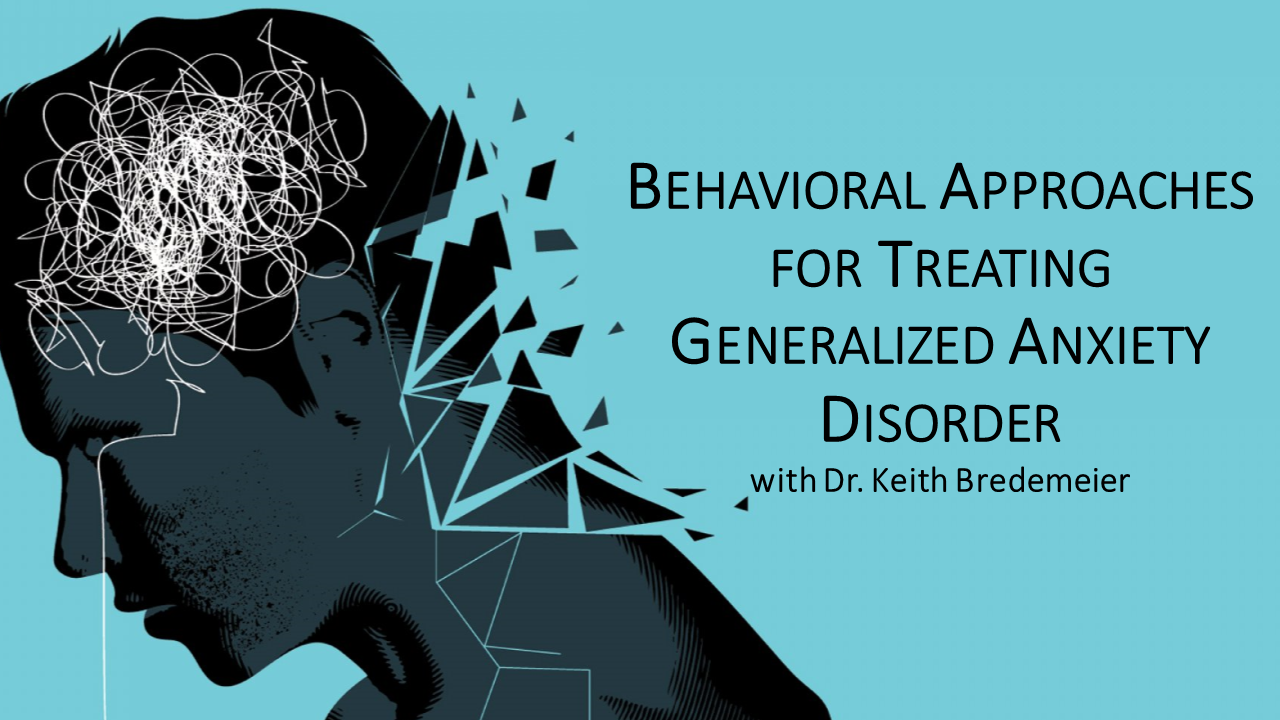Behavioral Approaches for Treating Generalized Anxiety Disorder

Date: Friday, January 22, 2021
Click here for application!
Time: 1:00-4:30pm EST
Cost: $225.00 USD per person
Location: Webinar (you will be sent meeting information and instructions via email the day prior to the workshop)
Workshop Description: Amongst anxiety-related disorders, many clinicians find generalized anxiety disorder (GAD) to be particularly difficult to treat effectively, perhaps due to the pervasive avoidant coping tendencies of these clients and the varying focus of their worries. Importantly, worry can be conceptualized as a cognitive form of avoidance, and this formulation has important clinical implications. Interestingly, the cognitive nature of this condition can lead therapists to presume that cognitive techniques are most suitable for these clients – however, several behavioral techniques have strong empirical support (as components of CBT for GAD protocols, or as standalone interventions). This workshop will focus on prominent evidence-based behavioral interventions for GAD – specifically, attendees will learn and practice implementing stimulus control strategies, applied relaxation skills, problem-solving tools, and exposure therapy techniques.
CE Learning Objectives
At the end of this workshop, participants should be able to:
- Discuss key components of prominent cognitive-behavioral theories of GAD.
- Identify factors that can help differentiate worry from other forms of repetitive negative thinking (e.g., rumination).
- Explain and implement relaxation strategies (diaphragmatic breathing and progressive muscle relaxation) to address physiological symptoms in GAD.
- Explain how stimulus control strategies can be used to address worrying in clients with GAD.
- Explain and implement techniques to facilitate problem-solving in clients with GAD.
- Explain and apply strategies for using both in vivo and imaginal exposure techniques to address feared outcomes and intolerance of uncertainty in GAD.
About the Presenter
Keith Bredemeier, Ph.D., is an Assistant Professor and Director of Research Training at the Center for the Treatment and Study of Anxiety. Dr. Bredemeier received his Bachelors of Arts degree in Psychology at the University of Delaware and his Doctoral degree in Clinical/Community Psychology at the University of Illinois, Urbana-Champaign. In graduate school, his research focused on risk factors for emotional difficulties, with a particular focus on cognitive factors associated with anxiety and depression. He completed his predoctoral internship at Brown University, followed by postdoctoral fellowships focused on suicide risk and prevention in the Department of Psychosocial Research at Brown and the Aaron T. Beck Psychopathology Research Center at Penn. Dr. Bredemeier’s current research focuses on cognitive traits and difficulties involved in the etiology and treatment of transdiagnostic dimensions of anxiety (e.g., excessive worrying), repetitive negative thinking (e.g., rumination), and related problems (e.g., depression, suicidal behavior). He specializes in cognitive-behavior therapy (CBT) for anxiety disorders, including Exposure and Response Prevention (EX/RP) for obsessive-compulsive disorder, Prolonged Exposure (PE) for posttraumatic stress disorder, and CBT for generalized anxiety disorder and social phobia.
Target Audience
This presentation is intended for mental health professionals, researchers, and graduate students. The instructional level of this presentation is intermediate and formal training in PTSD assessment is not required of attendees.
Continuing Education
THE PHILADELPHIA BEHAVIOR THERAPY ASSOCIATION (PBTA) IS APPROVED BY THE AMERICAN PSYCHOLOGICAL ASSOCIATION TO SPONSOR CONTINUING EDUCATION FOR PSYCHOLOGISTS. PBTA MAINTAINS RESPONSIBILITY FOR THE PROGRAM AND ITS CONTENT. THIS PRESENTATION PROVIDES THREE (3) HOURS OF CE CREDITS FOR PSYCHOLOGISTS.
PBTA IS ALSO AN AUTHORIZED PROVIDER FOR CONTINUING EDUCATION CREDITS FOR PROFESSIONAL COUNSELORS, MARRIAGE AND FAMILY THERAPISTS, AND CLINICAL SOCIAL WORKERS LICENSED IN THE STATE OF PENNSYLVANIA - THIS PROGRAM PROVIDES THREE (3) HOURS OF CE CREDITS.
In order to receive continuing education credits, participants must:
- attend each hour of the workshop (no late arrivals or early departures)
- complete a course evaluation
If both of these requirements are met, you will receive a continuing education certificate after the conclusion of the workshop.
Instructions for Submitting Application
Applications can only be submitted via email at this time as a Microsoft Word or PDF attachment to:
Dr. Sandy Capaldi (sandraca@pennmedicine.upenn.edu)
Applications are due January 14, 2021 and must be completed in full.
Applicants will be notified of acceptance within one week of receipt of their application. Please do not make travel or other arrangements until your application is accepted.
Application Acceptance
You will receive a confirmation via email if your application is accepted. Note that we can only reserve your space when you provide payment information.
Payment Information
- Workshop fees are non-refundable after the application due date. Please note that payments will not be processed until after the application due date.
- We can only accept credit card payments at this time (Discover, MasterCard, and Visa). Unfortunately, we do not accept American Express.
Webinar workshop requirements:
- You must have utilities, internet service, phone service, and an appropriately private location at your home or office in order to ensure HIPAA compliance.
- The private location should be free of noise and distractions. (If you are the parent of young children, appropriate child care arrangements must be in place.)
- You must agree to attend each hour of the video conference and agree to use video of yourself during the video conference in order to track attendance.
- You must agree not to copy or distribute workshop materials provided to you in the course of the workshop.
- Since authentic patient audio/video is utilized during the training, you must agree to abide by all applicable rules of confidentiality and HIPAA compliance, including but not limited to no audio or video-recording of the workshop in any form.
You will be asked to affirm the previous conditions and your agreement to them prior to the commencement of the workshop.
Back to Top
